

50 Sufferers Describe Depression For People Who've Never Been Depressed. Photo: Leland Francisco I recently posted a question on my Facebook page asking people who'd suffered from depression to describe what it felt like so that those who'd never experienced it could understand it better.

Here were the responses: 1. Depression is seeing no future, and no answer for any of the problems in your life. 2. 3. 4. 5. 6. 7. 8. 9. 10. 11. US data shows autism rates up 30%, but disease not necessarily 'more common' The US government's estimate of autism has moved up again to 1 in 68 US children, a 30% increase in two years.
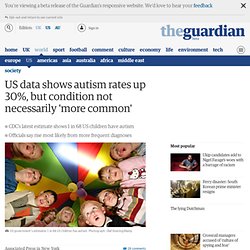
But health officials say the new number may not mean autism is more common. Much of the increase is believed to be from a cultural and medical shift, with doctors diagnosing autism more frequently, especially in children with milder problems. "We can't dismiss the numbers. But we can't interpret it to mean more people are getting the disorder," said Marisela Huerta, a psychologist at the New York-Presbyterian Center for Autism and the Developing Brain in suburban White Plains, New York.
The Centers for Disease Control and Prevention (CDC) released the latest estimate Thursday. Rethinking schizophrenia: Taming demons without drugs - health - 06 February 2014. Antipsychotic drugs may do more harm than good.

The tide is turning towards gentler methods, from talking therapies to brain training "I WAS trembling all the time. Sherwin Nuland: How electroshock therapy changed me. Man reunited with stranger who talked him down from suicide attempt. Six years after he stood on the edge of London's Waterloo Bridge preparing to jump off, a man has been reunited with the stranger who talked him to safety with the promise: "It'll get better mate, you will get better.

" Just over two weeks ago, Jonny Benjamin, 26, an ambassador for Rethink Mental Illness set out to find the stranger, whose name he could not even remember, in hope rather than expectation. But after TV, radio and newspaper interviews and a #FindMike campaign on Facebook and Twitter – backed by Stephen Fry, Boy George and even the deputy prime minister – Neil Laybourn, 31, from Surrey came forward and revealed that he was "Mike". "It was incredible," said Benjamin. "I didn't expect to find him; it felt like looking for a needle in the haystack. I couldn't remember anything about him, I couldn't remember his name – Mike was a nickname I gave him. " On 14 January 2008, Benjamin was ready to kill himself. "When he [Laybourn] came along it burst the bubble of that world I was in. Eleanor Longden: The voices in my head. Schizophrenia About this information IFP82.
This is an extract from a NICE publication.
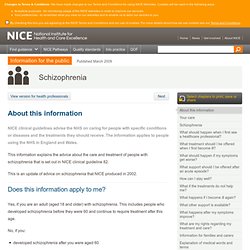
The complete publication is available at NICE clinical guidelines advise the NHS on caring for people with specific conditions or diseases and the treatments they should receive. The information applies to people using the NHS in England and Wales. Schizophrenia. These pages cover what schizophrenia is, what the symptoms are and how you can get treatment.

Schizophrenia is a mental illness that affects the way you think.It affects about 1 in every 100 people.It usually starts during early adulthood.It does not mean that you have a split personality or that you are likely to be violent.The symptoms of schizophrenia can be split into ‘positive’ and ‘negative’ symptoms.Positive symptoms include experiencing things that are not real (hallucinations) and having unusual beliefs (delusions)Negative symptoms include lack of motivation and becoming withdrawn. These symptoms are generally more long-lasting.Many different factors seem to affect whether you develop schizophrenia.Medication known and therapy can help treat symptoms of schizophrenia. These pages are created by the Rethink Mental Illness Advice Service in accordance with the Information Standard.
Last reviewed in February 2014. Next review February 2016. Rethinking the Placebo Effect: How Our Minds Actually Affect Our Bodies. By Maria Popova The startling physiological effects of loneliness, optimism, and meditation.
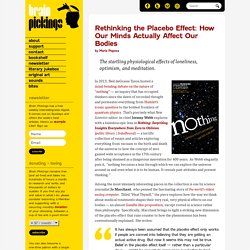
In 2013, Neil deGrasse Tyson hosted a mind-bending debate on the nature of “nothing” — an inquiry that has occupied thinkers since the dawn of recorded thought and permeates everything from Hamlet’s iconic question to the boldest frontiers of quantum physics. That’s precisely what New Scientist editor-in-chief Jeremy Webb explores with a kaleidoscopic lens in Nothing: Surprising Insights Everywhere from Zero to Oblivion (public library | IndieBound) — a terrific collection of essays and articles exploring everything from vacuum to the birth and death of the universe to how the concept of zero gained wide acceptance in the 17th century after being shunned as a dangerous innovation for 400 years. As Webb elegantly puts it, “nothing becomes a lens through which we can explore the universe around us and even what it is to be human. Schizophrenia. 6) Psychological explanations of Schizophrenia.
There are two explanations which can be placed under the umbrella term of ‘psychological explanations’, the psychodynamic and cognitive approaches.
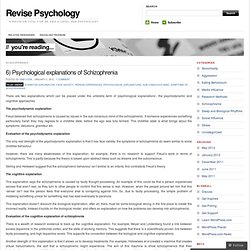
The psychodynamic explanation Freud believed that schizophrenia is caused by issues in the sub-conscious mind of the schizophrenic. If someone experiences something particularly harsh they may regress to a childlike state, before the ego was fully formed. This childlike state is what brings about the symptoms; delusions, grandeur etc. Evaluation of the psychodynamic explanation. There is a culture of acceptance around mental health issues in academia. Biological & Psychological Explanations of Schizophrenia. Schizophrenia is a chronic mental health condition that can cause a range of psychological symptoms which include hallucinations and delusions.

A delusion is something which a person believes to be true yet is untrue and a hallucination is hearing or seeing something that is not there or doesn’t exist. These are psychotic symptoms, with psychosis being the inability for a person to distinguish between reality and imagination. Ashbourne College's Psychology Blog. GeneticBiochemicalNeuroanatomicalViral InfectionEvolutionary Theories Schizophrenogenic familyExpressed Emotion Social Drift Hypothesis.
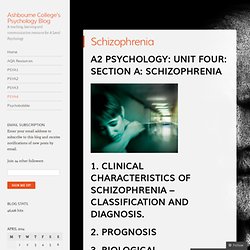
Schizophrenia. Home. Cognitive model of abnormality We have come across the cognitive model twice so far. Firstly memory is a topic from cognitive psychology and in stress we considered cognitive therapies aimed at reducing stress. Cognitive aspects of psychology are those that concentrate on thinking and processing of information. Just as behaviourism developed as a response to psychodynamic psychology, cognitive psychology developed partly to fill in the gaps left by behaviourism.
As we saw S-R psychology considers nothing between the stimulus and the response. Just as behaviourists consider maladaptive behaviour, cognitive psychologists consider maladaptive thoughts. A2 Psychology. Schizophrenia Think of ‘madness’ and we probably think of schizophrenia. It is the ultimate when it comes to psychological disorders and abnormality, strange then that as a condition it is so loosely defined, to the point were some psychologists even question its very existence!
Schizophrenia. Schizophrenia is a long-term mental health condition that causes a range of different psychological symptoms, including: hallucinations - hearing or seeing things that do not exist delusions - unusual beliefs not based on reality which often contradict the evidence muddled thoughts based on the hallucinations or delusions changes in behaviour Doctors often describe schizophrenia as a psychotic illness. Schizophrenia. What is schizophrenia? When a doctor describes schizophrenia as a psychotic disorder, they mean that, in their view, you can’t tell your own intense thoughts, ideas, perceptions and imaginings from reality. Views on schizophrenia have changed over the years. Questions have been asked about whether schizophrenia is one condition or more than one syndrome with related features. These questions drive both debate and research. Although there may be some discussion over the true nature of schizophrenia, most psychiatrists will diagnose and treat in the same way.
32 Reasons Why The “Schizophrenogenic Mother” Concept Is Incorrect. [Written in 2008.] Level Psychology Psychopathology Revision - Explanations of Schizophrenia. No single cause has been identified, biological, behavioural and social research suggests a complex interplay between factors. 3) Biological explanations of schizophrenia. There are several different explanations for the disorder schizophrenia.
Schizophrenia: Explanations and Treatments. Genetics. Level Psychology Treatment Revision - S-Cool Revision Summary. Self-treatment and medication can be very dangerous. Not all mental disorders are serious or long lasting - many are mild and short-term. Most mental disorders can be treated effectively. Schizophrenia is caused by environmental not genetic factors. The Psychodynamic view of Schizophrenia. In this blog I am going to discuss the psychodynamic view of Schizoprenia.
32 Reasons Why The “Schizophrenogenic Mother” Concept Is Incorrect. Schizophrenogenic family. The fall of the schizophrenogenic mother. Can bad mothers and dysfunctional families cause young people to become schizophrenic? Schizophrenogenic mother. An evaluation of a Psychogenic and a Genetic theory of Schizophrenia - Psychology at AhISee - the site for Insight. Essay Outline. Schizophrenogenic Mothers and Mental Illness.
The-cognitive-explanation-of-schizophrenia. Schizophrenia - Treatment. Psychosocial Treatments for Schizophrenia. Schizophrenia treatment. The ABCs of Cognitive-Behavioral Therapy for Schizophrenia. Oliver Sacks: What hallucination reveals about our minds. Suzana Herculano-Houzel: What is so special about the human brain?